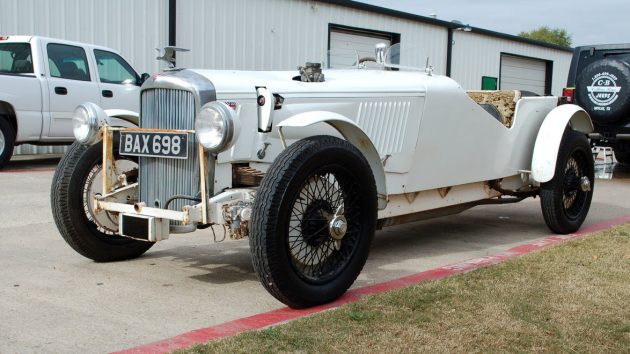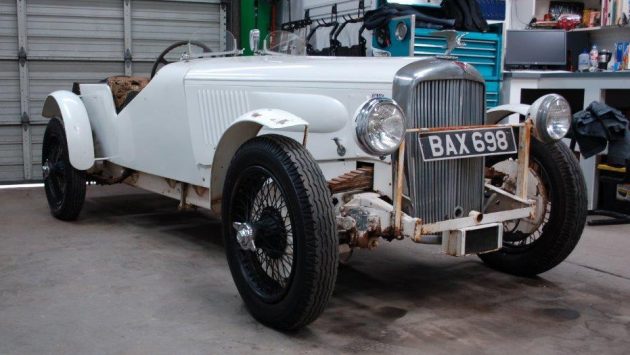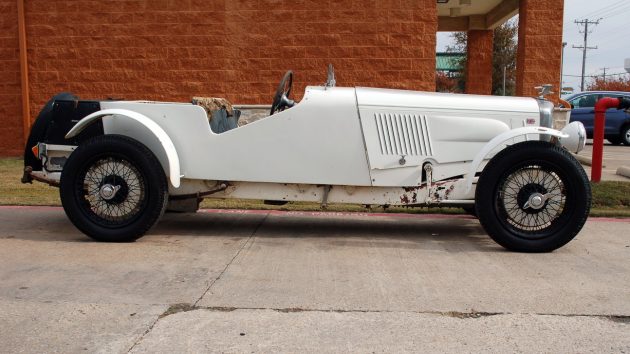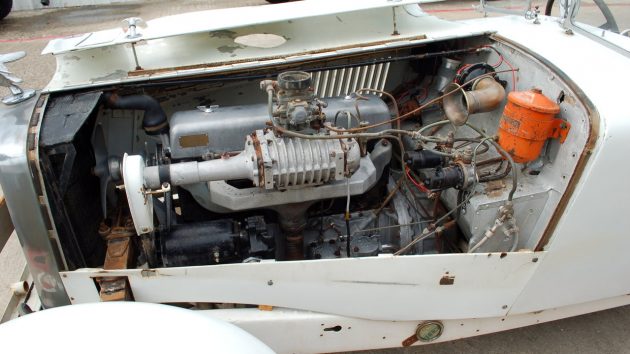A few years back, Jesse learned about a type of historic racing that we never really had here in the US (at least not that we knew of), but at one time in Europe it was huge. It’s called trials racing and was influential in the development of rally racing and hill climb events. Ever since he told me about it, I’ve wanted to find a ’30s open wheel British touring car that we could take trials racing, sadly finding something like that on this side of the world is rather difficult. So I was quite excited when I learned about this ’37 Alvis Speed 25! With it’s custom racer body and supercharged Crested Eagle engine, it would be an awesome trials car. Oh and did I mention that it’s on this side of the pond? You can find it here on eBay in Wylie, Texas with an asking price of $85k.
This is an extremely well documented car from a very historic manufacturer. Alvis never really imported their cars to the US, so finding one on our shores is always special. This one started life in Coventry, England as a Speed 25 Saloon, but some time in the early ’70s it made its way to an Alvis specialist in Birmingham who built it into the special you see now. I’m not sure how it ended up all the way in Texas from there, but I’m sure that’s an interesting story too.
While $85k is a lot of money, when you compare it to a Bentley or Rolls Royce from this era, it’s a great deal! It might not have the presence or power of either of those, but it’s supercharged 2.5 liter inline 6 should have plenty of power for most of us. No word on the condition of the engine is given, but I’m going to guess it isn’t running and will need work. Finding parts for it might be a bit of a challenge here in the States, but thankfully it’s complete. You can see find more information and photos of it here.

I really wish this Alvis were in my budget, I would absolutely love having it. This might sound crazy, but I would get it running, safe to drive and actually use it as my daily driver. I know it wouldn’t be terribly practical, but how awesome would it be to climb into this thing and set off to work everyday? I’m not sure if this one was built to be a trials car in the ’70s or if they just wanted a sweet roadster, but I love the way it looks and I think it would do quite well at trials and hill climb events! So do any of you happen to know more of this Speed 25’s history?







What a beast. This ain’t no “girly man’s” car, for sure. Carb sticking through the hood? What’s with the British, don’t they have dust over there? ( Morgan’s never had air cleaners either) I’ve driven a lot of different vehicles in my life, but even this is a bit intimidating. Unless I have the wrong model here, whoever did this to this magnificent car, should be tarred and feathered.
http://www.remarkablecars.com/photos/1937-alvis-40775.jpg
If this was originally a Speed 25 Saloon — and I’m no expert on Alvii — it was originally a sedan, Howard. That’s what “saloon cars” are in the U.K. (why?).
Doesn’t excuse the conversion, though it happened often, even back in the day. A fair number of Bentley “Le Mans”-bodied 3- and 4 1/2-Litres left the factory as sedans, some a bit ungainly.
Oh, and as for the holes in the bonnet and the unfiltered carburetter — talk about Brit cars, ya gotta spell like a Brit! — with my level of metalworking skill, this is what I’d end up with…. Seriouly, I could never understand leaving the carb. unfiltered.
ok i give up what the heck is trials racing?
Don’t know if the meaning has changed, but back in the 1950s it was referred to by some in the U.K. as “mud-plugging.” Participants ran cars — mostly spindly little “specials” based on pre- and postwar English Fords — against the clock over hilly (and usually wet and muddy) courses.
I remember seeing a few magazine articles about these events. They seem to have attracted quite a few entrants — including Colin Chapman before his Lotus 7 days — and looked like good dirty fun!
Awesome car, I love a good hood ornament on the classics. :)
Does it come with snow tires?
Combine (mostly) home built specials, the typical crap weather, and wacky Brits, and this is what you get.
British Sporting Trials:
https://www.youtube.com/watch?v=OXou5fDs6HI
Trials was also a motorcycle sport, typical event would be set up to have a number of ribboned off sections of ground that would take the rider over terrain that would include wet logs, large slippery rocks, creek beds, tight turns, and steep hills. The goal was to not loose forward motion or to put your foot down while trying to get threw a section. Points against you were recorded for each infraction and at the end of the event the person with the lowest score won the event. If you want to see how tough this is just YouTube motorcycle trials and watch what is expected of a trials rider. As for this car yes its modified but it was probably done at time when that wasn’t a big deal. Lots of cars through out the history of the car have ended up being purpose built for racing and that is what has become of this car. To rich for my blood but a cool car none the less. My last word on this car is if you want to take this car back to its original form all that is needed is cash and a good restorer, it’s not the end of the world that this car has been converted.
If you read Brit car magazines years from years ago there were always accounts of the latest “trials” out in the countryside. The point of it all seemed to be to get some of your buddies together to see who could get stuck in the deepest pool of mud or the thickest tangle of brambles, and then get out again. Then once you had a good time doing that, it was time to head for the nearest pub for a few pints of bitter, then maybe a supper of steak and kidney pie plus more pints of bitter.
Anyway……all the trials cars I have seen are like the ones in Pete W’s link—small, light, and especially narrow so they could get through the thickets of brambles and small trees that trials were often held in.
I think this Alvis is unlikely as a trials car because it would have been too big and expensive for that. But who knows? Maybe it did show up at some trials. It would be a hoot to see some photos of it competing with the regular small fry trials cars.
Agree with Mark S. This Alvis was probably modified by some guy is his backyard garage to make it into a stripped down Brit hot rod.
It is not Trials Racing as it is not about speed, often parts of the route would be on public roads where it would be illegal to race. Sporting trials is the ultimate development of 2 wheel drive car trials and is unique as motor sports go. Like most trials, it’s not about speed.
The aim of a trial is to drive as far as you can over a laid out section without stopping. Each section is marked with poles to form a twisty route up a slippery hillside, sometimes sections will be so slippery and steep that you are unable to walk up them.
To help each driver there is a passenger in the car who moves their weight around to get the best possible traction on each wheel. The further on a driver gets up a section the lower the score. The driver with the lowest score of the day is the winner. There is a championship for both drivers and passengers.
See more here http://www.btrda.com/BTRDA_History/
More than likely a hill climb car. The added power would have been a help, while it would be a hindrance in trials work.
These cars are front wheel drive using Tracta joints.
They could have a least put some Lucas P100’s on that thing instead of something off an old Dodge (or whatever) truck, because that’s what it looks like now.
IRL, about $80K aggressive….. It’s a parts car.
Parts supplies are found here:
tp://www.redtriangle.co.uk/
Greetings All,
This started out as a Saloon. That most definitely is not the bodywork that came with the car, with the exception of the bonnet,which begs another question. Typically, the Brits don’t cut holes in their bonnetfor intakes that poorly.
One other thing, for some unknown reasons the Brits typically like to run blowers off the front of the engine, a la Bentley Boys, not inside, not always but if it started that way, the inlet bonnet hole would be better.
This was a saloon to start, somebody noticed the Red Triangles selling well and decided to To a little cosmetic surgery.
$85K, no way. More of a parts car. Nebulous wording doesnt help.
Wm Lawrence is correct. The Trials claim is wrong (I´m being polite). If built for any kind of competition, this is a VSCC hillclimb car.
There are 2 kinds of trials events in the UK. One is post WW2 in origin, uses ultra light and ultra specialised cars to go up short muddy hills/through woods on farmland. Cars had their origins in Austin 7, the first Lotus was one.
The second trials event is older, goes back to 1900s, and is a tough 18 hour combination of road driving and stages on tracks/pathways/brideleways. Lands End Trial is the most famous. VSCC also does these trials in a lighter form for rich folk, but the Alvis would be a bit long, too powerful and fragile. Buy a model A for 1/10th of the price and win.
The Alvis 20/25 Special is well-looked upon in the UK. They are high quality cars (up there with Bentley) and can be made to go very fast. This one is a bit ugly, has obvious needs, is expensive but a good project to build something beautiful. You can get all the spares from a company called Red Triangle in UK. Alvis still exist as a military equipment company, happy to sell you light tanks (real off-roading) but not cars or spares.
I’ve owned a number of better looking Bentley Mark VI Specials, generally built when the bodies were so rusted that they weren’t worth repairing. I’ll bet that’s the story behind this car. Today a well built Bentley Special commands a higher price than a restored saloon but this is pathetically over-priced. Who in America sits around fantasizing over an Alvis?? Nobody – that’s who!
Hi Brakeservo, I do now.
I’m guessing the supercharger might have been added in the USA. Many of the English ones mostly had superchargers added to the front of the car. Does any of you well informed barn finds readers know what make the supercharger is? The price is way too high, even with the exotic engine. I’ve just bought a similar looking special (but with smoother lines) converted from a 1975 Mercedes 250 saloon and bearing more than a passing resemblance to a late 1920’s SSK for £1650 (about US$2250?) and it is drivable with an excellent non supercharged engine. It needs work but is an easy restoration being also free of any significant rust, though the chrome is in poor shape. If anyone knows where I can buy a supercharger, in any part of the world, I would be very interested, but what type of supercharger would Mercedes have used in the 1920’s?
Oh, I’ve just noticed that the car has what looks like an English number plate.
Greetings All,
Mike, there are a variety of manufacturers of blowers. There is a lot more choice now with makers utilizing CNC. Years back mating one that was too big used to be an issue now they are much more compact.
Decide where you want to mount it, inside the bay or in the front.
Benz used a Roots unit in the 540K. Zoeller was also used by several European manufacturers.
What did they use for a frame being tha MB is a unibody car?
I think Howard Crude was in the Saloon when he thought this Mud Bogger up They should not have given him last call except he had lost the the special under water air cleaner somewhere under his booth Soo he took the bogger home and let Chester his pet mouse have a go at the seat and was just about to call the scrapper when he read some where that he could salvage the nice wheels and when he went to put them on ebay he passed out and fell on the zero on his keyboard I think his brother in law was on trial not at the trials
Over the years, Brits have offered custom bodies to put on cars that were still sound but for serious tin worm damage, One could even rebody your Rolls with the latest look alike body Come to think of it, we had Devin and LaDwari etc also.
That poor lump looks like it might have been modded in Texas or Oklahoma etc. Someone could pretty it up tho.
Wm Lawrence, Did you bother to look at the pictures in the advert? You will clearly see the rear axle, so you are not correct in saying these are front wheel drive.